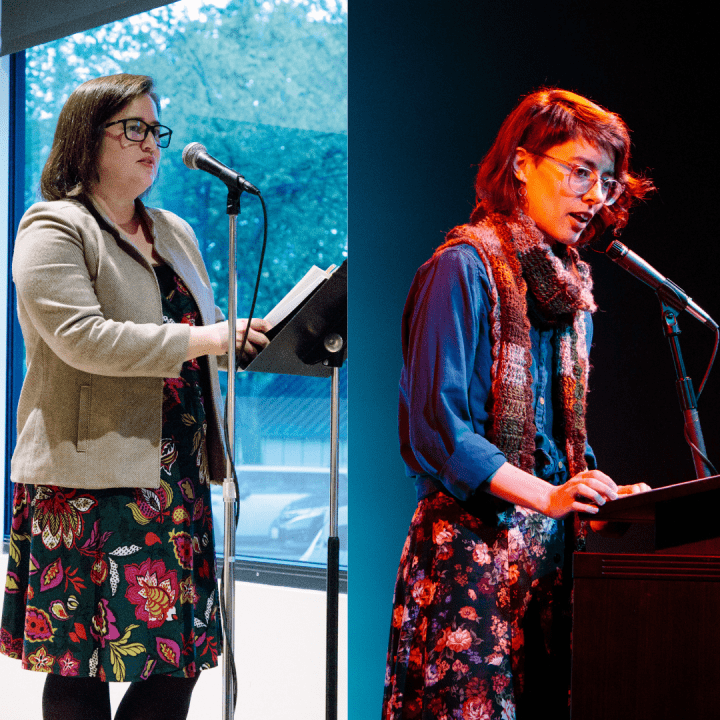
An Interview with Laura Da’ & Arianne True, Co-Mentors of Seattle’s Youth Poet Laureate Program
October 21, 2020
By Gabriela Denise Frank
As our nation’s underpinnings come under greater scrutiny, I’ve been in a parallel process of personal inquiry, digging into generational and cultural foundations that have shaped my writing practice and relationship to art-making, capitalism, and self-worth.
You know, easy, light stuff.
Months of reflection have revealed how my upbringing isn’t a closed chapter titled, The Past, but deep programming rooted in the pursuit of perfection—a drive to be liked, to be “good”, and to be successful. While I can’t [yet] stop it from arising, I’ve learned how to interrupt the cycle of anxiety and judgment. I pause. I remind myself: it’s okay to take up space, to speak, to experiment, to make mistakes, to fail to produce what I envisioned, or produce anything at all. Still, as a child of the 70s and 80s, it’s difficult to put aside my Material Girl self who quests, first and foremost, for results that can be tracked, measured, displayed—and praised.
My conversation with poets and educators Laura Da’ and Arianne True, co-mentors of this year’s Seattle Youth Poet Laureate (YPL) program, contributed rich thoughts to this inquiry. They spoke about their approach to learning as an intentional act of co-creation, an interactive dialogue in which they seek not only to teach and counsel but to learn from their students. The notion of a multi-layered exchange rather than a top-down transfer of knowledge felt exciting and very different from how I was cultured to learn.
“I’m constantly getting new ways to look at poetry from my students,” Arianne said. “I also ask myself when designing classes: what does each person here need and how can I give it to them?”
Our discussion touched on Indigenous worldview in creativity versus the hierarchy of white dominance in education which, as Laura noted, “is a system that’s developed to assist you in your excellence but also to maintain the territorial borders of writing and dominant narrative.”
She described what has felt true my whole life, a feeling I’ve struggled with but couldn’t name. The more I poke at this system that produced me, an architecture my parents warned me, a first-generation college student, not to question or disturb, the more clear the purpose of its checklists, tasks, and rewards for straight-A’s—the distractions I’ve busied my mind with. These are not building blocks of learning but borders separating us from engaging whole-heartedly with each other, meaning as imperfect, interdependent humans sharing an interconnected world.
In addition to weaving together a writing community with the YPL cohort, part of Laura and Arianne’s work will include helping the students learn when to chill out, too. “They are very motivated and driven,” Arianne said. “Part of what we want to do is help them learn to rest.”
Laura agreed. “We have a cohort of incredible leaders doing important advocacy work in their communities already. We wanted to build time for instruction around what a healthy writing life looks like.”
When I asked Laura and Arianne about their own writing practices, they spoke in terms of pattern, supportive conditions, desk rituals, and the importance of mentoring others—a holistic learning ecosystem in which teaching, learning, and writing feed each other.
“I’m more invested in putting my generative efforts into writers who haven’t published yet,” Laura said. “I count that as part of my practice as much as I count producing new work. I think it’s healthy to have big moments in your time as a writer where you’re doing a lot of reading or teaching in your community and producing less.”
“Teaching is a huge part of my writing practice,” Arianne said. “I can’t imagine that disappearing. It would be weird and jarring and I don’t think I’d know what to do. Teaching is really important to how I write and what I need to write.”
Our conversation spurred my thinking about childhood conditioning and what happens when one’s education or upbringing are codified on individual achievement, yes/no answers, and quantity. Americanness is (was?), in part, defined by pride in what one supposedly achieves alone, yet this goes against reality—we do nothing alone—and our nature as a social species. Our current zeitgeist reflects the beginning of a reckoning both overdue and unsettling.
It fills my heart with joy to know that a cohort of young poets, supported by Arianne and Laura, will be offered different paths and a practice of self-understanding that supports community and creative risk-taking alongside reflection and feeling.
“It’s not just about a poem or presentation on stage,” Laura said, “it’s about what our cohort wants to co-create in terms of a model for how a writing community works together in a new way.” As part of the SAL community, we have the good fortune of participating in their growth, too.
In January, I wrote a list of what I hoped to accomplish in 2020. When I was done, I went back and crossed out Goals in the title and wrote Intentions. Even though the revision more accurately reflected how I wanted to frame my thinking, the correction irritated me at the time: I had messed up a “perfect” handwritten page with a strikethrough from the start.
Now, I see it was the first step into a larger world.
The following conversation has been excerpted from a longer interview. If you’d like to listen to the audio version, click the play button below.
.
.
I spoke recently with Aaron Counts and Matt Gano, who co-founded the Seattle Youth Poet Laureate (YPL) program in partnership with Seattle Arts & Lectures (SAL). Now in its seventh year, you are shepherding the program together as co-mentors. How did you come to these roles?
Laura Da’: I’ve been working adjacent to WITS for the last couple of years. I’m a curriculum developer in a local school district, and I love teaching, but I needed work that was a bit more adjacent to the classroom. I was excited when the opportunity came up to join this program. I’m also the Writer-in-Residence at Hugo House, where I co-create and facilitate a yearly cohort.
I got to talking with folks at SAL about the YPL program, and they were hoping Arianne would want to be a part, too. I ended up running into her at Elliott Bay Books right afterwards and I was so excited, but I knew I couldn’t say anything. I was very effusive about the books she was picking out—I remember it really fondly. She said, “Wow, you’re all dressed up,” and I said, “No, no, I had just had this interview—kind of,” and she said, “You have tassels and velvet!”
I’ve admired the YPL program and love seeing the writers, and I’m excited to be part of this legacy. I think it’s really unique. I’m also looking forward to the flexibility of such a different year and what can come out of it.
Arianne True: I’ve had the program on my radar for a bit. I thought, That is so cool. I super hope I get to work with that, but I would never have dared to ask because it was such an established thing. I’ve only been with WITS a few years and I didn’t want to be presumptuous. I thought, I’m not gonna say anything and hope that someday it’ll just work out in, like, ten years.
I do remember running into Laura in the bookstore. The main thing I remember was, she was, like, not quite vibrating but jumping up and down and kind of prancing, which I’d never seen her do before. It was delightful. And then she said, “I have good news. But I don’t know if it’s good news. And I can’t tell you and I’m bad at secrets. So I need to go now.” I really love when people are self-aware and are, like, “I cannot do the thing that I know I need to do. So I have to leave. Thank you. Goodbye.” Then I got a text from Alicia that asked to talk. She said, “Do you wanna do this?” and I was, like, “More than anything!”
I had been the Youth Writer-in-Residence at Hugo House, which doesn’t exist anymore, but some elements feel similar. You’re publishing work, you’re getting mentorship. I produced a chapbook, curated events, did youth outreach in the community. It’s in a similar tradition. With the WITS (Writers in the Schools) residency, you don’t get to work with students for that long, but I’ve wanted more long-term connections with students. With YPL, we will get to see them grow and develop their writing over a longer time span. It’ll be really exciting to get to spend a whole year with them, especially Bitaniya, and help nourish her manuscript, which is going to be amazing.
.
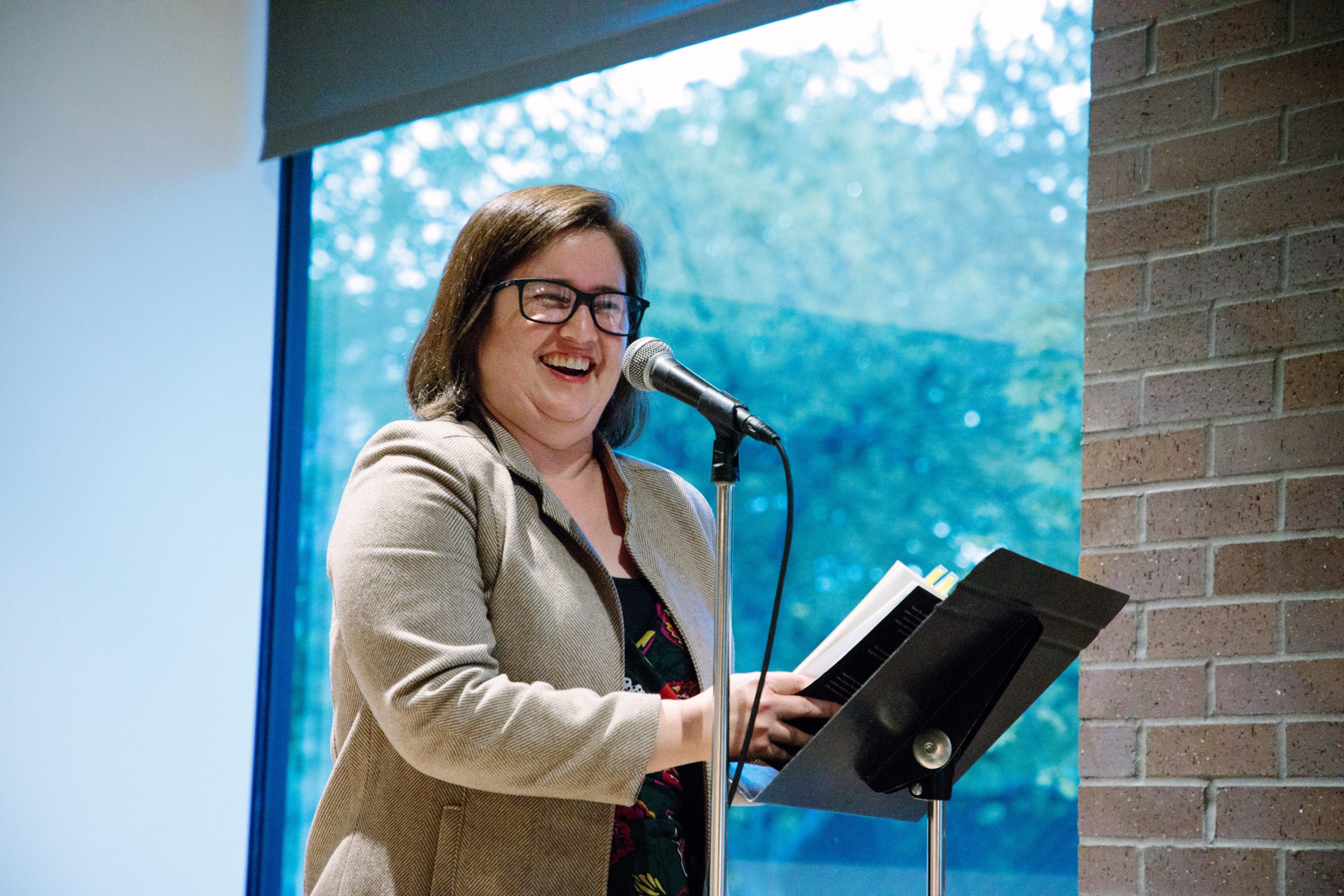
Laura reads at a Local Voices event in April 2018.
.
What are your goals for the program?
Arianne: One goal we’ve been working on is helping the students learn when to chill out. They are very motivated and very driven. Part of what we want to do is help them learn to rest.
Laura: We have cohort of incredible leaders who are doing important advocacy work in their communities already. We wanted to build in time for instruction around what a healthy writing life looks like. I would associate that with a concept of getting centered as a young writer and being able to create boundaries and have moments of mental health and affirmation. It’s been really exciting to see what comes up when we have less of an objective-driven philosophy, which happens so much in education. It’s not just about a poem or presentation on stage; it’s also about what our cohort wants to co-create in terms of a model for how a writing community works together in a new way. It’s been really neat to take a pause and capture what they need.
Arianne: We’re asking them to make the program with us, and they are telling us, “We want to meet a lot more. We don’t want to see each other just every few months. We want to see each other every month with the option to hang out every week.” That’s been really cool.
What does the plan for the coming year look like?
Laura: We’re shifting into a virtual space, which is a little different, but we’re hoping to continue the legacy of readings at local bookstores and literary centers. It’s really exciting. We’ve looked carefully at how this cohort expresses themselves and how they self-identify in terms of strengths. We wanted to build in as many opportunities for leadership as we could, so we have ambassadors taking on different roles. Student ambassadors, for instance, will help us identify places for community engagement, including readings that we may not know about as part of the literary establishment. We intend to facilitate as many kinds of opportunities for readings as we might beyond a typical year.
Arianne: They’ll have monthly meetings as a cohort, and they’ve also asked to organize writing circles more often than that, so they’ll be doing a lot of their own writing in addition to the work they’re doing in the community.
How did this cohort come together?
Arianne: As you can imagine, a few dozen applications from brilliant young writers are hard to pare down. This cohort is amazing. While they’re not all going to be the YPL this year, we want them to be involved in building community. As Laura was saying, we have three ambassador roles with specific responsibilities. The other cohort members are all fantastic writers from a range of ages. They write very different stuff. We have people who focus heavily on musical poetry and people who write totally out of left field—surprising, dark fiction. They’re a wonderful complement for each other as a whole.
Laura: We have eleven members in our cohort, and I would echo all those things. I would point out, too, that another cohort member is functioning as an ambassador for future years. We’re hoping to expand access to the application and we’re looking carefully at how applications function. We want this to be an open, equitable process. We have youth leadership working on how to get the word out to as many schools, regions, and areas as we can.
One thing I’ve admired about the process of selecting these young writers is that it was done in community through a large panel with lots of different representatives. It was an interesting way to learn about the program. We looked carefully at the students’ writing. Every student who applied made me feel like I knew them; I was very invested in their work. The process was a fantastic thing to be a part of.
Has the cohort expressed what’s important to them this year?
Arianne: They want to be writing a lot. We send them prompts twice a month and they often reply, Thank you so much. They’ve asked for more writing time together.
Laura: Like all writers, they’re longing for a sense of how to hold their writing in a way that’s compassionate but also allows them to understand how to be more precise, more lyrical. Our young writers are looking for time together to better understand the path to greater clarity around writing purpose.
Arianne: They want to be socially involved, especially now. They want to know how to ground their time in making the world better, not just writing. Their interests are very broad and society-driven.
.
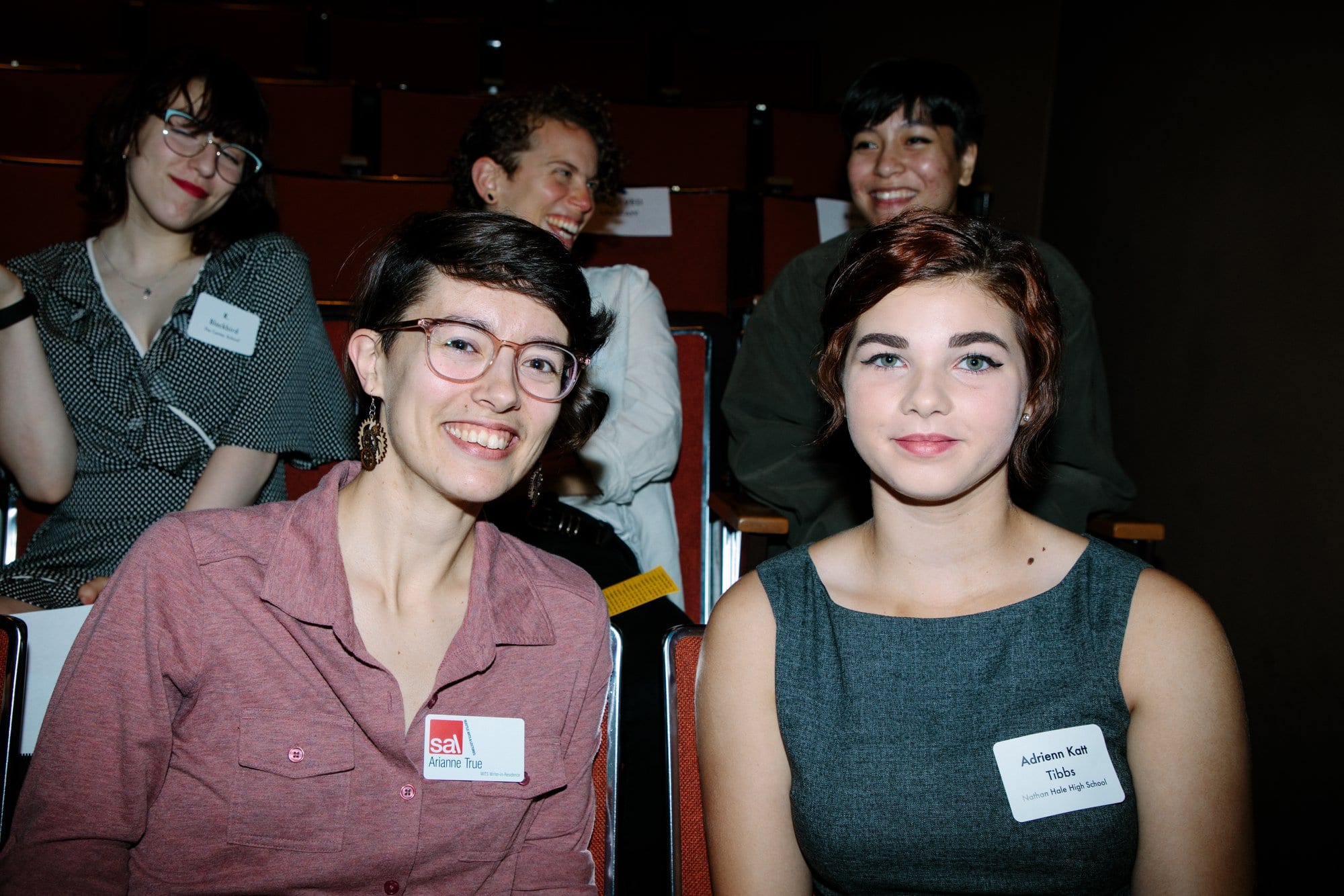
Arianne at a WITS Year-End Reading in 2019.
.
As you work with Bitaniya Giday, the Seattle Youth Poet Laureate, on her book, will she send you drafts of poems to workshop? How will her book come together?
Arianne: She knows a lot of what she wants for her book. I will ask questions, and she’ll be like, “Well, I think it looks like this.” We’re like, “Oh, what do you need to make that happen?” And she’s, like, “These are the things I need.” And I’m like, “Cool.”
Laura: Bitaniya is just incredible. She has a lot of experience in how to envision a project and see it through to its fruition. We’ve been facilitating resources, lending affirmation, and helping to problem-solve around areas of change. We have a monthly check-in plan. Bitaniya is coming with so much incredible poetry that it’s a matter of merging her visions of how she wants it organized and what narrative or organizational patterns she perceives for the work. It’s been delightful to talk to her and learn from her.
Arianne: I think slam poets make excellent page poets because they have a good sense for so many things. It can push you, to see what you can do with a page, because you know what you can do with performance and how you can move people. You’ve felt the impact your work has on people viscerally; now, you want to figure out how to keep doing that on the page. Bitaniya has expressed the desire to bring her performance onto the page.
Laura: We’ve had rich discussions about how to utilize the space of a manuscript to capture things that happen in spoken poetry. We’ve had some fascinating talks about musicality and the spirit of performance. I’m so excited to see the final draft because I feel like I’ll learn a lot from it. It’s such a strength to come from a performance background; Bitaniya understands collaboration and how to create for a purpose. She’s so ready to create this incredible book.
Arianne: Because she has so much background already, she knows a lot about what conditions help her create the way she wants to. She’s able to tell us how she writes best and we’re like, “Cool, how can we make that happen for you?” She knows a lot about her creative process, and her vision for the book.
In addition to you both being Jack Straw Writers, Hugo House, as you mentioned, is a place that brings you together. Congratulations, Arianne, on becoming a Hugo Fellow this year!
Arianne: Yeah! Laura and I are working together as co-mentors through YPL, and Laura is going to be mentoring me through my first book as well.
Laura: I can’t wait! It’s going to be so interesting. Everything I do, I look at it as co-creating. I’m not comfortable with hierarchies of leadership, especially in writing. It’s like a garden—you can’t just tell it to grow. I’m excited to have this opportunity to work together in these two different but connected ways.
Arianne: I’m super excited to absorb your wisdom as we work together on someone else’s project, but I’m excited to have a direct collaboration on something I’m working on.
Laura: I have a similar feeling. I think about the book you’re going to produce and the book Bitaniya’s is going to produce. They’re so significant because when you are part of a community that’s not the dominant literary community, your book is more than a book. It makes other books possible. It’s a really exciting doorway. I think about Sherwin Bitsui’s first book, Shapeshift, which I feel made my book possible. Growing up, I had never seen a book of Indigenous poetry, so these books are very meaningful. The idea that you get to be part of them or see them growing up is really exciting.
Arianne: I know the book I’m writing would not be possible without Layli Long Soldier’s book, Whereas. My book would never have come into existence if her book didn’t exist already.
.
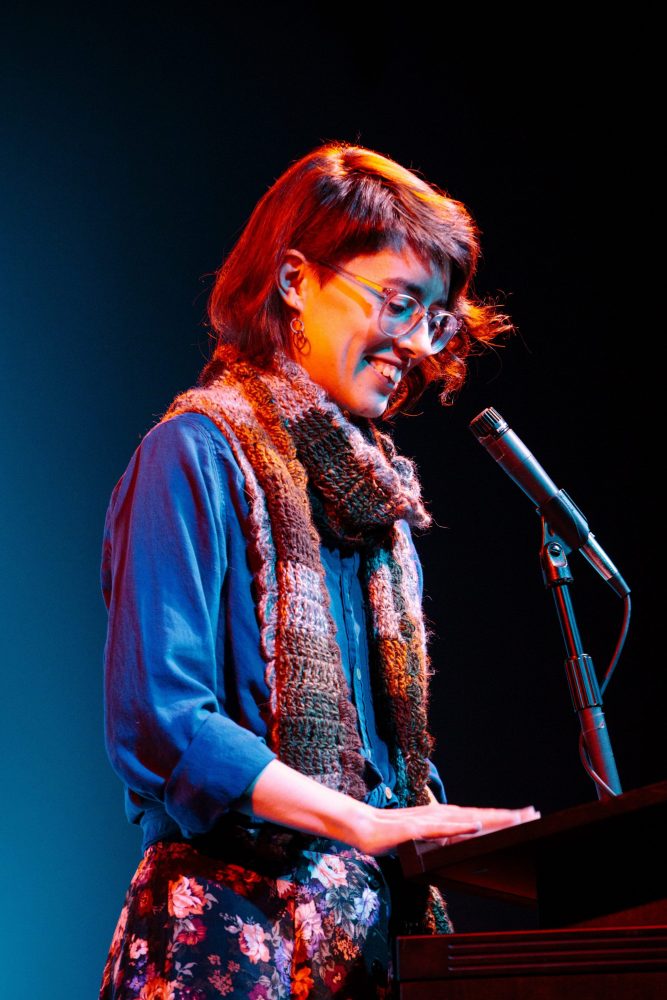
Arianne at a Local Voices reading in November 2019.
.
Arianne, can you tell us about your project?
Arianne: I’m writing a book of experimental poems that will comprise a museum experience. It’s meant to be immersive—readers are going to go into the bathroom and they will need to exit through the gift shop—so part of the book is the museum itself and part is the supplemental curators, materials, and background research from museum scholars. I’m using found poetry and existing texts, sometimes putting a piece in them or using them as word banks.
The book looks at child abuse and how specific people interact with museums. People know how to look in the space of a museum, but we don’t know how to look at child abuse. There’s a way you know how to see; let me direct your gaze. And Natives and museums, of course, have a historically dodgy relationship. I’ve worked in museums before and I’ve had weird experiences. It’s like, “Oh, we can take you to see all the collections we have from your people.” And I’m like, “Cool, but these shouldn’t be here.” There’s an element of repatriation that’ll be happening throughout the book, and I’m starting to understand exactly what that’s going to mean.
Conversations around supporting one’s creativity—what you need to create the work—come up in Laura’s organizational strategies class. Laura, can you talk about that?
Laura: Sure. I really enjoyed teaching that class this summer. I thought a lot about the idea of executive function and organization as it applies to creativity, and to the hierarchy of white dominance versus Indigenous worldview. It’s a fascinating consideration because it’s individualistic—the way our minds work impacts our executive function and how we perceive organization to begin with—but I also see it as protective interior gatekeeping in literature where, if you are coming from a place of privilege, these elements of organization have been very intentionally taught and maintained.
It’s a system that’s developed to assist you in your excellence but also to maintain the territorial borders of writing and dominant narrative. I have a theory that the best teachers often teach things that don’t come naturally to them. Organization—I was not taught that. I wasn’t socialized to organize a manuscript in a way that is ready for consumption. I’ve considered it from a sociological perspective: How do people do these things? What are the lines on the map that some perceive and other folks cross without knowing? Instead of having it be instructive, what if it was a path to knowing yourself and your own socialization and worldview? What if we utilized it as a strength to create a vision of the negotiation between your concepts or ideas and the reader?
I appreciate having these kind of communities to co-create this concept. The more writers you get a chance to talk to, the more exposure to different methods of organization or methods of visualizing you get to see and perceive.
Arianne: There’s writing poems, and then there’s putting out books. You need a lot of those skills and practices to get a book together and get it out there that you don’t need to write poems.
Laura: It’s true. Think of the organization of how you create a manuscript, for example. It has a protective function when you’re coming from a non-white background. For me, I see a series of Easter eggs where some of the Indigenous knowledge or worldview is privileged. I’ve had to think about how to anticipate an outside gaze so that it doesn’t create trauma in terms of my writing life and the sustainability of continuing to write in a community that has a long way to come. And to be more open to a true pattern of voice.
.
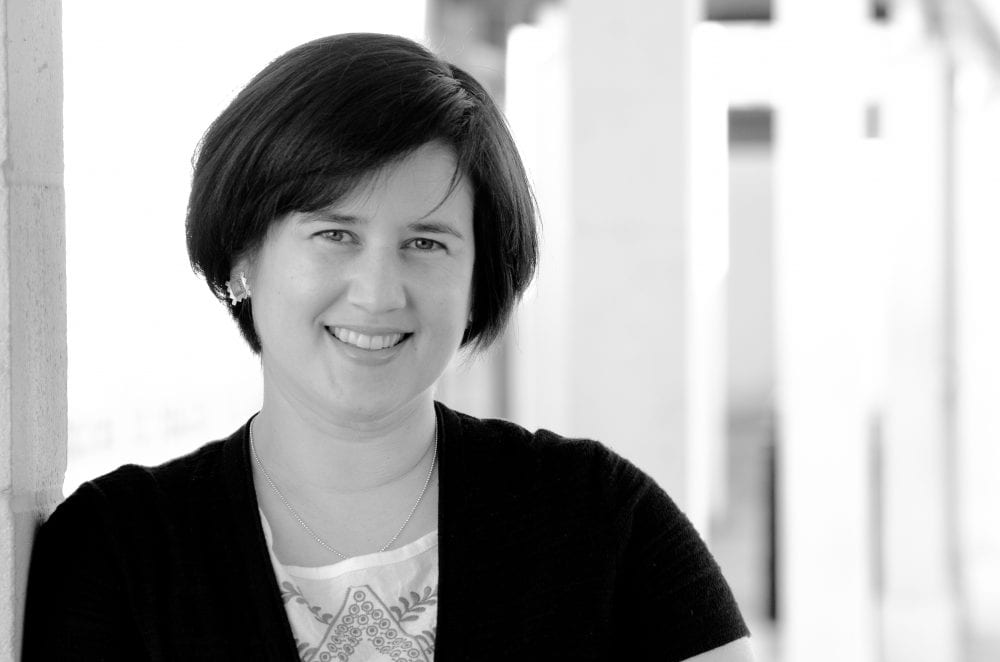
Laura Da’.
.
What about your own writing practices? How does writing happen for each of you?
Laura: It’s an interesting question because I love hearing people talk about their writing practice and I kind of loathe talking about mine. Superficially, I will always kind of decry that I don’t have a writing practice and I don’t believe in any of the prescriptive pieces. In reality, I do utilize quite a bit of pattern in my writing practice, and I’m at a stage in my writing career when I’d like to pull back from the pressures of publication. I’ve published two books and I’ve been anthologized pretty often. I’m more invested now in putting my generative efforts into writers who haven’t published yet. I count that as part of my practice as a writer as much as I count producing new work, which I’m not doing a lot of lately. It brings me a sense of integrity and wholeness, to be able to articulate that. I think it’s healthy to have big moments in your time as a writer where you’re doing a lot of reading or teaching in your community and maybe producing less. I’ve been in that moment, personally, for the last year or so. It’s been some of the best moments of my writing life to invest my time and practice in other people.
Arianne: I am a bit similar. I don’t like a lot of prescriptive stuff. I’ve never really resonated with anything that has to do with time, which I think is maybe some Native stuff, maybe it’s something else. One of my mentors in grad school wrote his second book every morning before his day job. That’s not me at all. For me, it’s more about knowing what I like, what are the conditions that lead to me creating, then I make those conditions. I’ve known since I was a teen that I write in community. When I don’t have a writing community, I don’t write. The more I read, the more I’m around other writers, the more I’m teaching and the more I’m in writing communities, the more I write, so I keep myself in community.
I’m not time-based at all but I’m very place-based. I need to have a space where I know I can always go. My desk has very sacred rules around the amount of clutter and pile it is allowed to have. There’s a level of access I am required to have at my desk. And there are places I go where I know, when I am there, I will want to write, so I bring things that I can write with. When I have an out-and-about day killing time between different things in a random park or a random sidewalk—those are times I know I’m going to write because it’s the right condition. Teaching is a huge part of my writing practice. I can’t imagine that disappearing. It would be weird and jarring and I don’t think I’d know what to do. That’s really important to how I write and what I need to write.
What are you excited about or grateful for?
Arianne: I feel excited about and thankful for so many things. I’m getting so many cool opportunities, like the Hugo Fellowship or YPL. I just got asked to run Hugo House’s young writers cohort this year, which is for high school students. I’m so excited for all of those things and to work with youth poets and my own stuff. I’m so thankful for everyone who’s taking me on because all of those are really big acts of trust and big statements of faith in me as a writer and my teaching practice. I’m thankful for all the people who have been involved in that and I’m really excited to do all of it.
Laura: I’m really excited—this is connected—to have a place where I have the opportunity to see and be a part of folks’ creative fruition. I’m excited that I’m able to be in community even during this time of isolation, and it’s the writing world that has allowed that. I’m very grateful to be part of this community because it is a lonely and isolating time, and this program provides a beautiful antidote to that sense of isolation. I’m also grateful just for the seasonality of time. It’s a beautiful and a consistent thing that, no matter what’s happening, we’re moving into a new season. I’m always very grounded by its patterns and changes.
Arianne: Yeah, the seasons. I think that’s so much of what keeps me going—noticing what blooms, what dies, what new things come out.
 Gabriela Denise Frank is a literary artist whose work has appeared in galleries, storefronts, libraries, anthologies, magazines, podcasts, and online. Her essays and fiction have been published in True Story, Hunger Mountain, Bayou, Baltimore Review, Crab Creek Review, Pembroke, The Normal School, and The Rumpus. A Jack Straw Writer and Artist Trust EDGE alumna, Gabriela’s work is supported by 4Culture, Mineral School, Vermont Studio Center, Jack Straw, Invoking the Pause, and the Civita Institute. www.gabrieladenisefrank.com
Gabriela Denise Frank is a literary artist whose work has appeared in galleries, storefronts, libraries, anthologies, magazines, podcasts, and online. Her essays and fiction have been published in True Story, Hunger Mountain, Bayou, Baltimore Review, Crab Creek Review, Pembroke, The Normal School, and The Rumpus. A Jack Straw Writer and Artist Trust EDGE alumna, Gabriela’s work is supported by 4Culture, Mineral School, Vermont Studio Center, Jack Straw, Invoking the Pause, and the Civita Institute. www.gabrieladenisefrank.com